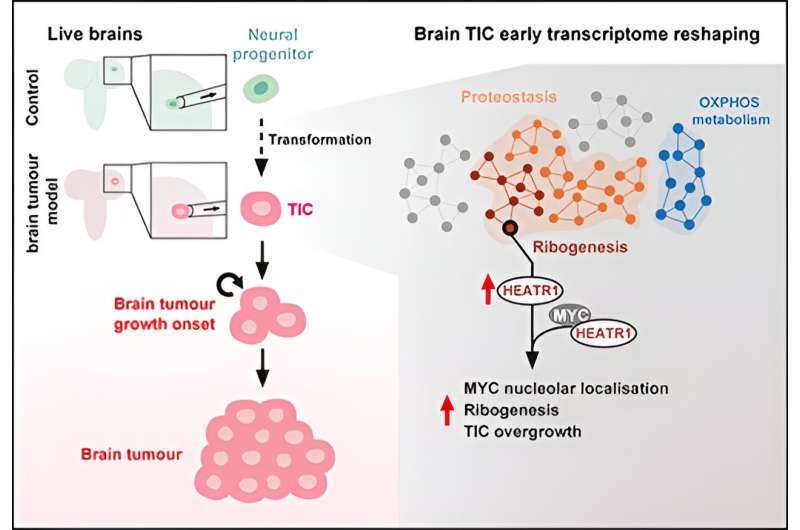This article has been reviewed according to Science X's editorial process and policies. Editors have highlighted the following attributes while ensuring the content's credibility:
fact-checked
trusted source
proofread
Study offers new insights into earliest stages of brain tumor development

Scientists working to better understand and find a cure for brain tumors have made progress in identifying initial events in cells that can lead to tumor growth.
The research team—based at the Brain Tumor Research Center of Excellence at the University of Plymouth—uncovered "readying" processes that occur just prior to brain tumor onset but which could be vital for tumor growth.
Using Drosophila fruit flies as a model, they were able to pinpoint changes that can be involved in turning a healthy cell into a tumor cell inside the brain. They then translated some of the findings using glioma cells.
The data uncovered enabled the research team to identify in greater detail a mechanism whereby the protein HEATR1—the overexpression of which is linked to poor prognosis in glioma—works with the growth regulator MYC and is required to increase the production of ribosomes that are essential machinery within cells for brain tumor growth.
In a study published in EMBO Reports, the team—led by Dr. Claudia Barros—say more work is needed to understand the precise implications of these very early changes.
However, they add that slowing or preventing tumor growth is vital in improving quality of life and survival rates for patients.
The research contributes to our understanding of how brain tumors could form and opens up avenues of research to find new potential drug targets for therapies of glioma tumors.
"Using the fruit fly Drosophila as a model, we have been able to identify and examine cells at the very initial stages of brain tumor formation inside the brain. These cells have most striking differences in their metabolic and protein balance landscape compared to normal cells," says Barros.
The study is the latest to be published as part of ongoing work taking place at the Brain Tumor Research Center of Excellence at the University of Plymouth.
That wider work is helping researchers to develop a better understanding of brain tumors, which include low and high grade types.
"There is much work still to be done but these early findings are significant because, with more investigation, it could help us develop new treatments which will target tumor cells more effectively and so improve outcomes for patients," says Dr. Karen Noble, director of research, policy and innovation at Brain Tumor Research.
More information: Laura R Diaz et al, Ribogenesis boosts controlled by HEATR1-MYC interplay promote transition into brain tumour growth, EMBO Reports (2024). DOI: 10.1038/s44319-023-00017-1



















